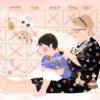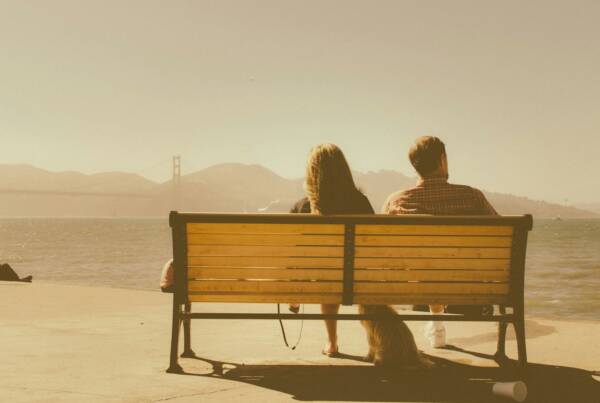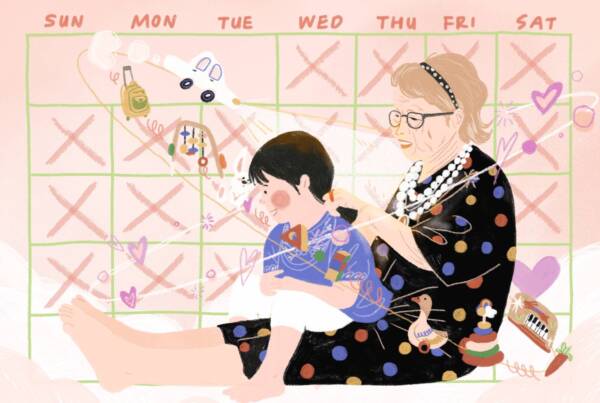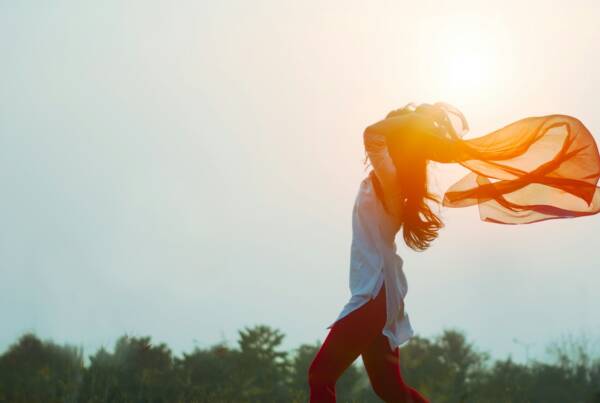Words by Anwesha // illustration by Dafna Barzilay
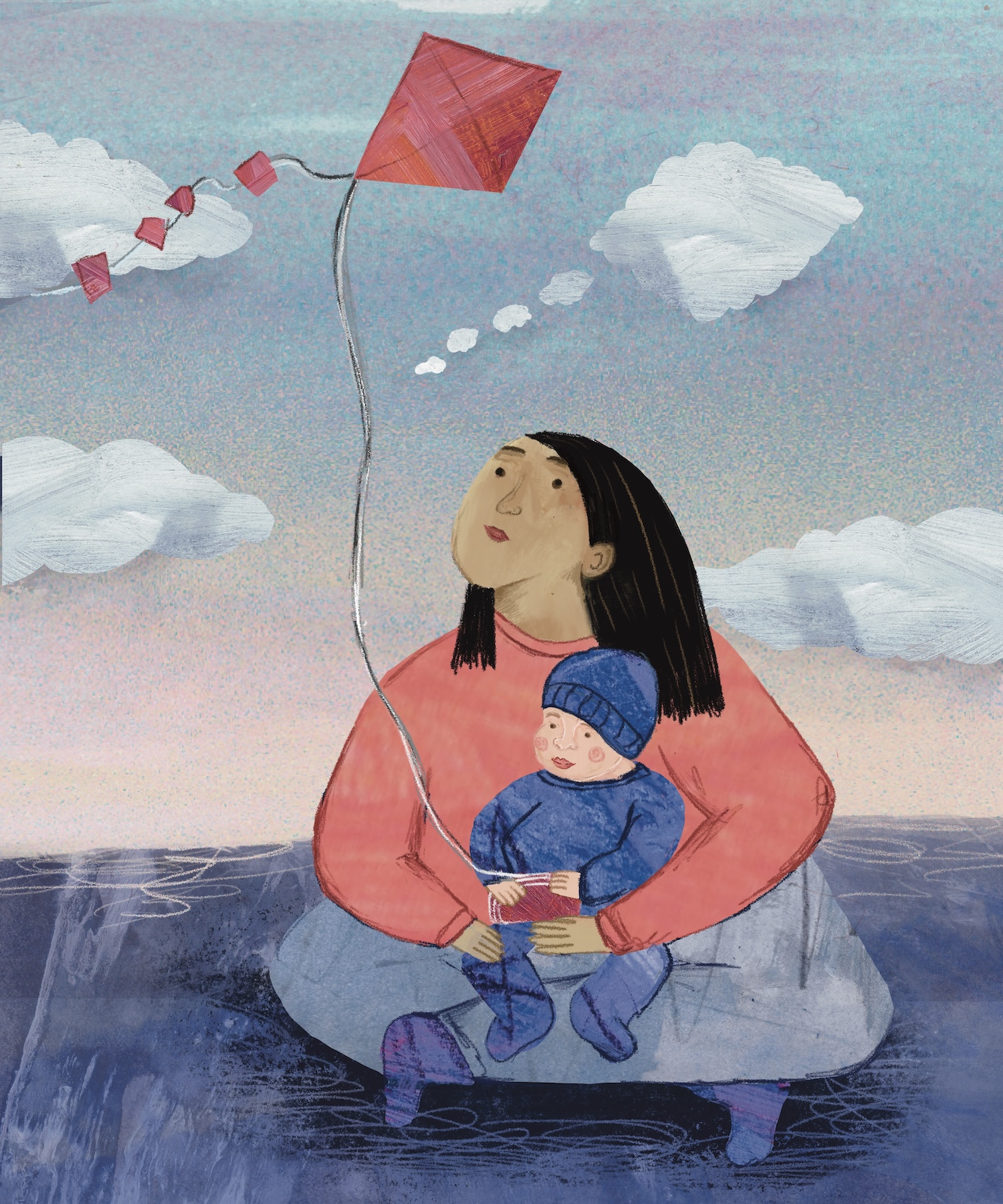
“Don’t you want your son to have a sibling?”, I’m asked when I tell people I’m not sure about having more children.
I have an 11-month-old, napping in my arms while I sit still on his floorbed writing these words. My legs fall asleep more readily than he does during nap time on an average day.
Do I want more children? The daily struggle of feeding, clothing and cleaning him sways me towards a “Hell no!”. But then the rush of oxytocin from seeing him smile at a friendly stranger sends me swinging back towards a “Yeah, maybe one day”.
The lack of time I have for anything creative, anything resembling self-care or self-actualisation – Nope. The thought of my child having a sibling to rely on and play with – Never say never!
And I could keep speculating indefinitely, but the real gamble lies in the hope that this hypothetical future life is somehow worth the dysregulation and ill health that follows the drama of pregnancy and childbirth, which no one can really promise me.
Parenting a single child in a nuclear setting, where neither parent has consistent and reliable support to fall back on, is nothing short of a colossal shitshow. And I cannot begin to imagine the fresh hell that adding another child into the mix would bring.
In the early dysregulating postpartum months, I felt less available, less emotionally present, less capable of performing my parental duties for my child than I do today. Due to postpartum health complications, I was also less physically able to perform the round-the-clock chores that parents have on their never-ending to-do list. Would it not be ironic to put my family through the instability of a second child so my child can have another stable* figure in their life?
*Assuming that they get along, and that they are hopefully not estranged in 20 years.
I get this general sense from society that anyone choosing not to “give” their child a sibling is seen as doing them a disservice. In my case, the disservice I’d be doing my child, by almost certainly failing to cope with the monumental pressure of parenting multiple children, far outweighs the disservice of not giving him a future playmate. I myself am an only child, and I didn’t enjoy a fair chunk of my childhood due to loneliness, but I am also acutely aware of the source. I was close with my cousin, who I treated like a sister, but having her didn’t make up for the loneliness that came from having emotionally absent parents – From never being asked how I am, or who I am, from never quite getting the sense that I’m allowed to be my own person, not just someone else’s plaything or personal project.
And that’s why it’s important to me that my son doesn’t feel alienated from his parents. The choice to be “one and done” allows me the room and emotional regulation to get to really know my son, rather than mould him into a form that’s most comfortable for a burnt-out, stressed-out ol’ mummy. Given a choice between limiting the consistent rupture that comes with the dysregulation of parenting multiple children and the fantasy of my son having a sibling, I choose the former.
Then there is the economic layer to this conundrum. In many ways, the choice to be one-and-done isn’t a choice for my family at all. My partner and I value creativity, frugality and living an authentic, connected life. If we were to have another kid in this economic climate, I don’t see a way forward that doesn’t involve getting tied up in jobs we don’t have the option of quitting should they no longer work for us. Or not having a giant mortgage for a house big enough to contain our family members. Or a car big enough to cater for us all. In many ways, we wouldn’t be the same people – we’d have to say goodbye to our creative personas, goodbye to any sense of leisure, forced to pander to the hyper-capitalistic ways of modern society – just to be able to get by. I refuse to accept the implication that parenting comes with a pact to relinquish any and all creativity and self actualisation on the parent’s part for the “good of the children”. I don’t think it does our children any “good” to grow up around depleted, bitter and resentful parents who are struggling to simply stay afloat.
Such questions about whether I’ll give my child a sibling carry the assumption that having another child is simply a matter of “want”-ing one. They seem blissfully oblivious to the surrounding context of the political landscape of motherhood. In that realm, I find it interesting how we are often sold this idea that the heavy, life-altering and body-altering task of motherhood is something we should be doing out of the goodness of our hearts. Like artists working for exposure and emotional fulfilment in lieu of proper payments. The emotional weight of parenthood can often feel less like a source of joy and more like a force that guilts you into suppressing your very real feelings—especially when you navigate the hardships of parenting without the support of a village.
No wonder “maternal rage” is widespread in today’s world. A wise person on the other end of a perinatal helpline once told me that “your anger is a signal that you’ve experienced some form of injustice”. The loss of dignity and the endless compromises required just to do a passable job at parenthood make anger the most understandable—and arguably the most acceptable—emotional response for mothers. You don’t need to have postpartum depression to be enraged by the injustice of being dumped with the responsibility of single-handedly raising a child for hours a day in this modern, patriarchal world that treats you as invisible while you struggle to get your most basic needs met.
As first-time parents, we are sold the idea that a parent is something we simply “become”. And then when we have another child, it somehow “works out”. And consequently, the burden of responsibility of care falls back on the parents, while support systems for them remain shockingly barebones. Yet, somehow, if you are anything but unequivocally delighted about motherhood, anything but thrilled about the thought of having more children, you face judgement from the army of armchair critics that seems to solely exist to make parents’ lives more complicated.
This expectation, for mothers to be a deity – more Mother Mary than mortal – setting aside their own needs for the good of the children, while the world around them doesn’t pause to recognise it, is omnipresent. This lens of viewing the choice to be one-and-done as “selfish” is a symptom of a society that treats mothers more like a resource than a human.
Mothers are expected to relinquish every need of their own, every aspect of their pre-baby personality – essentially become caregiving machines who blend into the background – so their primary purpose becomes raising the future of society without ever uttering a word of complaint.
I sometimes wonder if anyone else thinks about the irony of expecting mothers to maintain this God-like nature while treating them as sub-human. We want women to be omnipotent, but don’t want to provide them with even the basic amount of respect that such entities would deserve. We could have consistent perinatal support in the form of a team of support workers, longer and fair parental leave pay, more child-friendly facilities in broader society, and a social village to help parents who are in a nuclear setting get through the most physically, emotionally and financially vulnerable time of their lives.
Instead, we get gifted: a gaping gender gap in both our professional and domestic lives, a medical system that leaves much to be desired when it comes to breastfeeding- or pregnancy-safe treatments; a world where men who voluntarily take on 50% of parenting duties are few and far between; and a heartbreaking amount of social isolation. Regardless, this choice to have another child is one that many people make. And in my case, it would most certainly be driven by emotion rather than any overnight surges in a sense of feeling supported by society.
I am a big believer of the following – If women don’t have the urge to have children, they don’t owe it to the world to burden themselves with the thankless task of raising the future of our communities, economies and societies. On my lowest days, I find it hard to name one thing that’s set up to make motherhood desirable in our hyper-capitalistic, patriarchal society. Human beings usually have a strong sense of attachment towards their offspring; that is the whole reason why we go through the drama of bringing them into existence, and then the struggle of keeping them alive. But women need more than sporadic surges of oxytocin to maintain the nervous system regulation and emotional resilience necessary to raise children while going through the hell that is postpartum. We have way too much on our plates to also have to solve the problem of who puts money into the pension pots of future generations.
I find it important to mention that, in my mind, having one child doesn’t seem as gloomy as some people would portray it. Going through the throes of motherhood has evoked in me a gratitude for what remains of my pre-baby life. I like the pockets of time I get to be creative, or learn something new, or cook a full, nourishing meal for myself, uninterrupted – more than I like the idea of a family of four. Maybe it’s selfish to prioritise your wellbeing as a mother in a world where a mother is meant to be a bottomless pit of giving and care and cleaning and cooking while being bloody delighted about all of it. But would I not want my child to grow up witnessing parents who don’t just tolerate their lives, but actually want to live it?
Despite my candour regarding the difficulty of this parenting gig, I love my child beyond what words can express. And If I were to make the choice to be one and done, I wouldn’t be making it despite my love for him – my love for him is precisely why I’d be making that decision. And I wish more people (including me) could really acknowledge the strength of the love that drives this decision, over and above the feeling of guilt that comes with making it.

